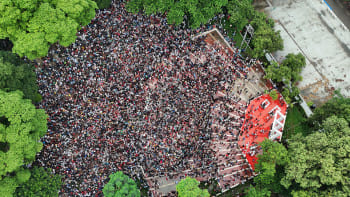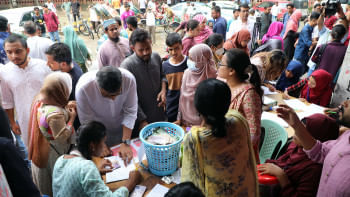How the youth are shaping a new era of meritocracy

The July uprising in Bangladesh marked a pivotal moment in the nation's history, where the youth rose up against not only economic injustice and political corruption, but also the deeply entrenched system of political elitism. For years, power in Bangladesh has been concentrated in the hands of a single political dynasty. The youth, representing more than half of the population, are now rejecting this system and demanding a new vision for the country—one based on meritocracy, equality, and true democracy.
The youth-led protests in July-August were a powerful response to a system that had long suppressed their potential. The protests, initially about the unjust quota system for government jobs, quickly evolved into a broader rejection of the deeply entrenched power structure as well as cultural narrative. This resonates strongly with Antonio Gramsci's theory of cultural hegemony, where the ruling class maintains power by controlling cultural norms and making their dominance seem like common sense.
Similarly, the shift in the youth's mindset—transforming from passive acceptance of their oppression to becoming active agents of change—is striking. These young people are no longer just protesting policies; they are fighting against a system designed to keep them in check. Paulo Freire's Pedagogy of the Oppressed foresaw this kind of transformation, where the oppressed, once aware of their condition, begin to challenge the very structures that oppress them. Gramsci and Freire both would likely see this as a predictable outcome, where awareness sparks resistance and a demand for real change.
The political elitism in Bangladesh has long been reinforced by a combination of patronage networks, nepotism, and symbolic gestures of reform. The quota system, initially designed to provide opportunities for disadvantaged groups, including freedom fighters' descendants and ethnic minorities, became a tool for consolidating power. Over time, the system was manipulated by the elites to secure jobs for their loyalists and families, leaving many deserving candidates feeling alienated. The youth's rejection of this system represents not just opposition to a specific policy, but a broader challenge to the hegemonic political structures that keep power concentrated in the hands of a few. The protests were a clear demand for a meritocratic system where leadership and opportunities are based on talent, hard work, and integrity—an evident outcome predicted by the counterhegemonic movement from Gramsci's idea.
The political elitism in Bangladesh has long been reinforced by a combination of patronage networks, nepotism, and symbolic gestures of reform. The quota system, initially designed to provide opportunities for disadvantaged groups, including freedom fighters' descendants and ethnic minorities, became a tool for consolidating power. Over time, the system was manipulated by the elites to secure jobs for their loyalists and families, leaving many deserving candidates feeling alienated.
In Bangladesh, the education system has long mirrored Freire's critique, which says traditional education systems often reinforce oppression by treating students as passive recipients of knowledge, rather than as active participants in their learning. Students are taught to memorise and conform, rather than think critically or challenge the status quo. This has effectively kept the youth disempowered, limiting their ability to question the political and social systems that govern their lives. As a result, many young people have come to view the political process as irrelevant or corrupt, leaving them disengaged from efforts to create meaningful change. But in a delightful change of scene, the July uprising showed that the youth are no longer willing to accept this passive role. By rejecting the quota system, they were also rejecting the broader culture of patronage and favouritism that has permeated the country's political and social institutions. Freire's "problem-posing" model of education, which emphasises dialogue, critical thinking and active engagement, is exactly the kind of reform that we need to empower our youth and prepare them to take on leadership roles.
The uprising was also a rebellion against the political elite, which has its roots in a deeper frustration with the contradictions of Bangladesh's democratic system. Elections, often plagued by corruption and manipulation, have not provided the kind of accountability or change that the youth are seeking. To truly address the root causes of political elitism and inequality and to prevent a similar situation in the future, investments must be made in educational reform and political inclusion, giving the youth a real voice in shaping the future.
The education system must be overhauled to prioritise critical thinking, creativity, and civic engagement. Freire's vision of education as a tool for liberation must be implemented, with schools and universities encouraging students to engage with real-world issues, challenge authority, and become active participants in their communities. Only by fostering an education system that promotes independent thought and problem-solving can Bangladesh equip its youth with the skills they need to challenge the political status quo and create a more equitable society.
At the same time, political reforms are essential to break the grip of bloodline politics. Bangladesh must create more opportunities for young leaders to emerge, whether through electoral reforms, greater transparency or efforts to reduce the influence of money and nepotism in politics. Youth participation in politics must be encouraged, and pathways to leadership must be opened to those who demonstrate merit and a commitment to public service.
Finally, the youth must be given the economic opportunities they need to stay in Bangladesh and contribute to its development, rather than being driven abroad by the lure of better prospects. The government must invest in creating jobs, support entrepreneurship, and address the structural inequalities that limit opportunities for upward mobility. By creating an environment where young people can thrive, Bangladesh can stem the tide of brain drain and ensure that its brightest minds stay to build a better future for the country.
The path forward will not be easy, but the July uprising has shown that the youth of Bangladesh are ready to take on the challenge. By reforming the education system, opening up political opportunities, and creating a more inclusive and merit-based society, we can empower our youth to become the architects of a new, more just and equitable future. It's time to dismantle the old systems of political control and give the youth the tools they need to build a Bangladesh that truly reflects their aspirations.
Ahmed Toufiqur Rahman is a development professional. He can be reached at [email protected].
Views expressed in this article are the author's own.
Follow The Daily Star Opinion on Facebook for the latest opinions, commentaries and analyses by experts and professionals. To contribute your article or letter to The Daily Star Opinion, see our guidelines for submission.

 For all latest news, follow The Daily Star's Google News channel.
For all latest news, follow The Daily Star's Google News channel. 










Comments